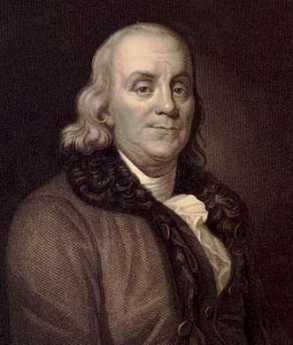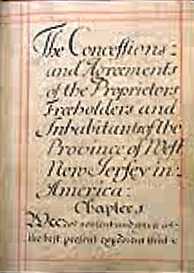Related Topics
Benjamin Franklin
A collection of Benjamin Franklin tidbits that relate Philadelphia's revolutionary prelate to his moving around the city, the colonies, and the world.

Articles of Confederation
The Articles of Confederation were written by John Dickinson, modified by others. Officially unratified for five years, the country was ruled under them in Philadelphia, for thirteen. They taught many lessons, which we sometimes forget we had experienced.
Quakers: William Penn
Although Ben Franklin gets more ink lately, William Penn deserves at least equal rank among the most remarkable men who ever lived.
Connecticut Invades Pennsylvania!
Connecticut once waged three serious wars with Pennsylvania, and we don't even remember it. But politicians noticed that all became peaceful after we united into a single nation. Others noticed the Articles of Confederation were strong enough to cope with invasions by neighbor states. The two proprietorships of New Jersey taught some smaller lessons. Virginia taught still other lessons.
Causes of the American Revolution
Britain and its colonies had outgrown Eighteenth Century techniques of governance. Unfortunately, both England and America lacked the sophistication to make drastic changes smoothly.
Charter of Pennsylvania, from Charles II to William Penn
William Penn suggested what he wanted, and the Royal bureaucracy suggested suitable modifications of the gift. The resulting charter is a shrewd and fair legal document, but contained a major geographical error.
...Pre-Convention Events
We had a varsity team, but we needed a plan.
Right Angle Club 2012
This ends the ninetieth year for the club operating under the name of the Right Angle Club of Philadelphia. Before that, and for an unknown period, it was known as the Philadelphia Chapter of the Exchange Club.
The Pennamite Wars
The Connecticut farmers believed the King's last word overturned all earlier ones, else why be a king? William Penn's revolutionary idea was that of private property -- the first sale created a new owner, whose new word erased any earlier ones. When you acquire a new continent from aborigines, that's a congenial viewpoint.
Robert H.Bork Upsets A Century of Antitrust Law
According to the late Robert H. Bork, it ought to be fairly easy to identify price-fixing, because legitimate cases that harm the consumer by price manipulation aren't common, or may not even exist. With this, Bork convinced the judiciary to abandon a century of contrary belief while still a young law professor, thus establishing his own reputation with Ronald Reagan. He was appointed Solicitor General by Richard Nixon, unfortunately thus embroiling himself in Nixon's impeachment.
The Origin of States Rights, a Rumination
ALMOST alone among the British colonies in America, Pennsylvania's western border was specified in the King's charter of the colony. It was "five degrees longitude west of the point where the eastern boundary crosses the Delaware" [River]; however, its actual location on the ground was not actually marked until 1784. It's a few miles west of the present city of Pittsburgh, located at the forks of the Ohio River, where the Allegheny and Monongahela Rivers join. However, until 1784 it was not a certainty that this complex was within Pennsylvania instead of Virginia. The origin of Ohio is at the only major water gap in the North-South mountains, and the tributary rivers are fairly large. The three merging rivers thus form a nearly continuous water route along the base of the mountain range, from the Great Lakes south to Pittsburgh, or from the Chesapeake Bay north to Pittsburgh, and then to the Mississippi, going past the best topsoil farming land in the world. The forks of Ohio were the great prize of the Seventeenth and Eighteenth centuries, the place where young George Washington himself started the French and Indian War. To include these treasures, it seems vaguely possible that William Penn insisted on having the border of his state safely include the water gap at the beginning of Ohio. Perhaps not, of course, perhaps it was just a sense of tidiness on the part of the ministers of Charles II. The original document stated that the border was a hundred miles east of there, to match where Maryland ended. When the document was returned to Penn by the King's ministers, however, it had the new language.
The existence of this north-south termination of Pennsylvania began to take on a new significance when other states made claims for their land grant to extend to the Pacific Ocean, and the extensions collided with each other. Virginia then developed its territory to include modern Kentucky and West Virginia. That resulted in Virginia's land aspirations veering northward, to include the Ohio Territory west of Pennsylvania's fixed boundary. By the legal standards of the day, Virginia had a fairly good claim to all of the Indian territories, not merely to the west of Pennsylvania, but extending at least to the Great Lakes, perhaps farther. Maryland, Connecticut, New York, and Massachusetts had conflicting claims from an infinite extension of their western boundaries. As a consequence, it was impossible to achieve ratification of the Articles of Confederation for five years. The various states involved were fearful of the creation of a combined political entity might result in a court which would be enabled to rule against their individual aspirations. The stakes were high; the land mass involved would be several times as large as England.
The person who finally broke this deadlock might well have been Robert Morris, who was disturbed that this inter-state dissension was injuring his ability to borrow foreign funds for the Revolutionary War. The internal negotiations took place under wartime conditions, and are poorly researched. No doubt some person deserves credit for bringing this wrangle to a close. Virginia had the strongest claim, New York the weakest. New York gave up its claim first, Maryland was the last, and Virginia the most disappointed. Pennsylvania, unable to make a claim, took the position that the land belonged to everyone, and eventually was mollified by getting a small notch of land extending to the Great Lakes at Erie. It must be noticed in passing that final resolution of the land claims came at the Treaty of Paris ending the Revolution. Benjamin Franklin, soon to become President of Pennsylvania, was the negotiator of the treaty which reflected Pennsylvania's position that the land belonged to all of us, right?
Even without these western land claims, Virginia was the largest and richest of the colonies, and rather easily adopted the attitude that Virginia would be the leader of the new United States. From their viewpoint, the preservation of states rights would enhance Virginia's leading the country. More or less immediately, the attitude of small states like Delaware hardened into resistance that this must not happen. Much otherwise inexplicable behavior also begins to make a sort of sense: the perverse behavior of the Lee family in the Continental Congress, the quarrels within George Washington's cabinet, the relocation of the capital and the dreams of the Potomac as the nation's main portal of transportation, the rise of Jefferson's political party, the obstructionist behavior of Patrick Henry, the Virginia domination of the Presidency for decades, and countless less famous episodes of history -- make more sense as residuals of Virginia's early land aspirations, than as defenses of slavery or philosophical convictions that states were somehow superior to nations. These suspicions are difficult to clarify and impossible to prove. The best way to see some substance to them is to imagine yourself in the Virginia House of Burgesses, politically connected and vigorous, able to imagine your descendants all inheriting a county or two of rich land as a remote consequence of a few glamorous deeds by their Cavalier ancestor.
Originally published: Thursday, August 16, 2012; most-recently modified: Friday, September 20, 2019
